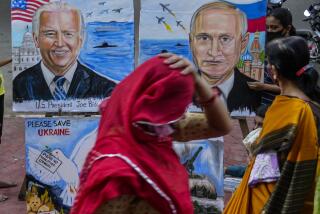South Asia Meeting Ends With Big Promises : Summit: Leaders vow to reduce trade barriers by December--and social woes by the year 2000.
- Share via
NEW DELHI — The South Asian Assn. for Regional Cooperation, the “poor man’s club” of India and its neighbors, ended a three-day summit Thursday with impossible pledges to the poor and illiterate, as well as a timetable to enact a preferential trade agreement by year’s end.
Indian Prime Minister P. V. Narasimha Rao, the summit’s host, admitted that “actual implementation” of decisions made by the 10-year-old regional grouping has often fallen short of the resounding rhetoric in the past.
But the organization, he declared, remains a valuable mechanism in a changing world to unite into a “stronger force” the desires and intentions of its seven members: India, Pakistan, Bangladesh, Nepal, Sri Lanka, Bhutan and the Maldives.
Prodded especially by India, those countries, whose populations total about 1.2 billion, agreed at the summit to consider forming a free-trade area. To implement a much more modest scheme of preferential tariffs agreed to in principle in 1993, Rao said he and the group’s other leaders decided that their commerce ministers will huddle in two to three months to determine which goods would benefit.
The aim is to have a South Asian Preferential Trading Arrangement ratified and in place by Dec. 8, the 10th anniversary of the regional organization’s creation, said Rao at a news conference Thursday.
Countries in the region have often used high tariffs to protect markets and industries.
*
Rao acknowledged that coming to agreement on lowering some of the levies was proving difficult, and that, so far, agreement had been reached on only 50 of 400 proposed items.
Member states reducing tariffs for each other, he said, “is the first step toward higher levels of trade and economic cooperation.”
But at the close of its eighth summit, it was obvious the group is still bedeviled by the same problems that have kept it from turning into as dynamic an organization as the neighboring Assn. of Southeast Asian Nations.
Most significantly, the summit’s final “Delhi Declaration” ignored a demand from Pakistan and some other members that the organization amend its charter so it could consider political disputes among members.
Specifically, Pakistan wants the group to become a forum where it can press its territorial demands in Kashmir and criticize India for alleged brutalities and human rights violations in the two-thirds of the territory that New Delhi administers.
At the closing session, President Maumoon Abdul Gayoom of the Maldives, who will host the next summit, lent his support to Pakistan’s arguments, saying further economic progress in the region depends on narrowing political differences.
Thursday’s final ceremonies were attended by leaders from all member states except Sri Lanka, whose president, Chandrika Kumaratunga, rushed home Tuesday to deal with renewed fighting in that nation’s 12-year-old civil war.
The association, whose secretariat is based in Katmandu, Nepal, includes three of the world’s 10 most populous countries and also some of the poorest. In the Delhi Declaration, the leaders vowed rapid relief for their most unfortunate citizens.
In some of the most fanciful passages of the 12-page declaration, the countries recorded their commitment to ending homelessness and illiteracy in South Asia by the year 2000, and to eradicating poverty, “preferably by the year 2002.”
More to Read
Sign up for Essential California
The most important California stories and recommendations in your inbox every morning.
You may occasionally receive promotional content from the Los Angeles Times.












